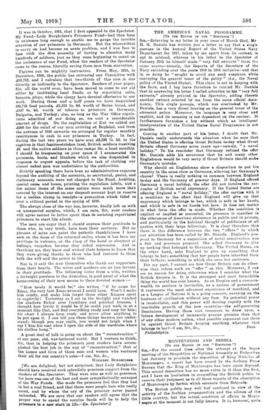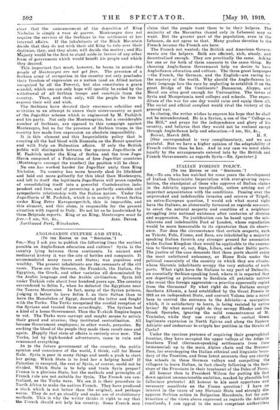MONTENEGRO AND SERBIA.
[TO me EDITOR or TOR EMMA TOR."] Sea,—For the second time after the attempt at the bogus meeting of the Sknpelitine or National Assembly at Podgoritza last January to proclaim the deposition of King Nicholas of Montenegro, a report has been issued by the Serbian Press Bureau that the King of Montenegro has been again deposed. This second deposition has no more value in it then the first. and I have no hesitation in counselling the British public to reserve their judgment as to all these reports of the absorption of Montenegro by Serbia which emanate from Belgrade.
The British public may well feel confused in view of the activity of the Serbian propagandists and the silence of the little country, but the actual condition of affairs in Monts negro at the moment is not fully known. It is, however, quits
clear that the announcement of the deposition of King Nicholas is simply a ruse de guerre. Montenegro does not require the services of the Serbians in the settlement of her internal affairs. If the inhabitants of the Black Mountain decide that they do not wish their old King to rule over their destinies, they, and they alone, will decide the matter; and His Majesty would be the first to stand aside in favour of any other form of government which would benefit his people and which they desired.
This important fact must, however, be borne in mind—the people of Montenegro are not yet free. The presence of a Serbian army of occupation in the country not only precludes their freedom of expression as a nation (and an Allied nation recognized by all the Powers), but also constitutes a grave scandal, which one can only hope will speedily be ended by the withdrawal of all Serbian troops and comitajis from the country. Then, and then only, will the people he free to express their will and wish.
The Serbians have devoted their enormous subsidies and activities to an attempt to annex their sister-country as part of the Jugo-Slav scheme which is engineered by M. Pashitch and his party. Not only the Montenegrins, but a considerable number of Serbians, aro opposed to this campaign against Montenegro, but so far the presence of Serbian troops in the country hat made free expression an absolute impossibility.
It is this element and this Imperialistic policy that is creating all the bad blood with Kumariis on the Banat question and with Italy on Dalmatian affairs. If only the British public will distinguish between the spurious Jugo-Slavia of M. Pashitch under the King of Serbia and the true Jugs- Slavin composed of a Federation of free Jugo-Slav countries (Montenegro amongst the number) the position will be clear.
No one has worked harder for Jngo-Slav unity than King Nicholas. No country has more bravely shed its life-blood and held out more gallantly for this ideal than Montenegro, and left to itself the legitimate Jugo-Slavia will prove capable of consolidating itself into a powerful Confederation inde- pendent and free, and of preserving a perfectly amicable and sympathetic relationship with the Italian nation. Under the Jugo-Slavia of M. Pashitch, which is in reality a Great Serbia under King Peter Karageorgevitch, this is impossible, and this element, and this alone, is responsible for the present situation with regard to Italy. Do not let us be hoodwinked by these Belgrade reports. King or no King, Montenegro must be







































 Previous page
Previous page